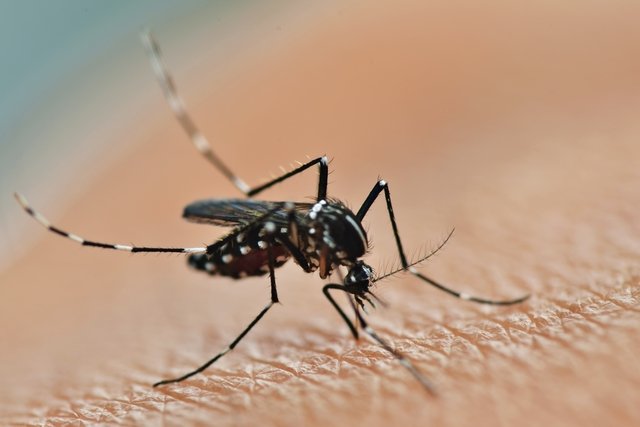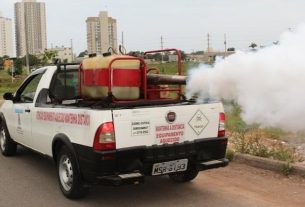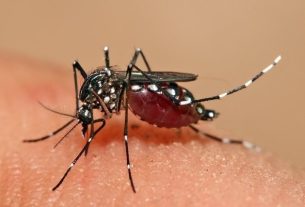Some of the complications that can be caused by dengue are severe dehydration, liver, heart, neurological and/or respiratory problems, in addition to hemorrhagic dengue fever, which is a serious reaction to the dengue virus that leads to bleeding.
Dengue is a disease caused by a virus that is transmitted through the bite of the Aedes aegypti mosquito, leading to symptoms such as pain throughout the body, red spots on the skin, tiredness, nausea and high fever. Check out the main symptoms of classic and hemorrhagic dengue.
If dengue complications are suspected, it is important to seek emergency care for an evaluation and start the most appropriate treatment, which may involve the use of serum directly into the vein and, in some cases, surgery.
Read too: Dengue: what it is, symptoms, treatment and prevention

Some of the sequelae and complications of dengue are:
1. Dengue hemorrhagic fever
Dengue hemorrhagic fever is a type of dengue fever that can occur especially when you are infected more than once with the virus.
In addition to changes in blood clotting, which can lead to bleeding, other symptoms such as low blood pressure, intense abdominal pain, frequent vomiting and drowsiness may also appear.
This type of dengue fever, if not treated quickly, can lead to death and its treatment is usually carried out in the hospital so that bleeding and hydration of the body can be controlled. Understand better what dengue hemorrhagic fever is.
Don’t ignore your symptoms!
2. Severe dehydration
Dehydration is one of the most common consequences of dengue and can be seen through some symptoms such as extreme tiredness, thirst, weakness, headache, dry mouth and lips, chapped lips and dry skin, sunken eyes and increased heart rate.
Dehydration can be prevented by using homemade serum and drinking other liquids, such as natural juices, teas and water. However, if symptoms appear, such as drowsiness, low blood pressure and difficulty drinking fluids, it may be necessary to go to the hospital, and treatment with saline solution directly into the vein may be indicated.
3. Liver problems
Dengue, when not treated correctly, can cause hepatitis and/or acute liver failure, which are diseases that affect the liver, leading to changes in the functioning of the organ.
In the most serious cases, these diseases can lead to irreversible liver damage, which may require a transplant.
In case of liver problems due to dengue, symptoms such as frequent vomiting, nausea, severe pain in the abdomen, especially below the ribs on the right side, swelling of the belly or yellowing of the skin and eyes may appear. Find out more symptoms of liver problems.
4. Neurological problems
Dengue can affect the brain causing complications such as encephalopathy, aseptic meningitis encephalitis or intracranial bleeding.
When the dengue virus affects the central nervous system, symptoms such as drowsiness, dizziness, irritability, mental confusion, convulsions, amnesia, psychosis, lack of motor coordination, loss of strength in parts of the body such as arms or legs, delirium or paralysis appear.
5. Guillain-Barré syndrome
The dengue virus can also cause inflammation in the spinal cord and nerves in the body, resulting in Guillain-Barré syndrome, for example, an inflammation of the nerves that can cause muscle weakness and paralysis. See the symptoms of Guillain-Barré syndrome.
6. Heart problems
Dengue can cause myocarditis, which is inflammation of the heart muscle or pericarditis, an inflammation of the membrane that surrounds the heart, with symptoms such as chest pain, shortness of breath, difficulty breathing, swelling in the feet or ankles or dizziness. See all the symptoms of myocarditis.
Myocarditis must be treated in the hospital, as it can put the person’s life at risk, and heart rate monitoring and medication may be recommended. In more serious cases, a heart transplant may be necessary.
7. Breathing problems
Dengue can cause an accumulation of fluid in the lung, known as pleural effusion, with symptoms such as shortness of breath, difficulty breathing, chest pain, which worsens when taking a deep breath or coughing, or a persistent dry cough. Know how to identify all the symptoms of pleural effusion.
Treatment of pleural effusion must be carried out in the hospital, and thoracentesis may be indicated, which is surgery to remove fluid in the lung.
8. Hemolytic uremic syndrome
Dengue can also cause hemolytic uremic syndrome, characterized by hemolytic anemia, a decrease in the number of platelets and acute kidney failure, and symptoms such as fever, chills, blood in the urine, red and purple spots on the skin or swelling in the hands or feet. See all the symptoms of hemolytic uremic syndrome.
Hemolytic uremic syndrome must be treated quickly in the hospital as it can be life-threatening, and treatment usually involves blood transfusions, medicines to regulate blood pressure or dialysis, for example.
9. Acute kidney disease
Acute kidney disease, or acute renal failure, is also a complication of severe dengue and is usually associated with direct damage to the kidneys from the dengue virus, low blood pressure, hemolytic uremic syndrome or rhabdomyolysis.
The most common symptoms of acute kidney disease are excessive tiredness, feeling short of breath, bloating, little urine, nausea, vomiting or mental confusion. See other symptoms of acute kidney failure.
The treatment of acute kidney disease is carried out in the hospital and can be done with intravenous hydration, medication or hemodialysis, in order to avoid complications that can put life at risk.
10. Acute pancreatitis
Although it is rare, dengue can also cause acute pancreatitis, which is inflammation of the pancreas, with symptoms such as swelling, abdominal pain, sweating, nausea and vomiting, loss of appetite and diarrhea, for example.
Treatment of acute pancreatitis must be started in the hospital with medicines directly into the vein, to alleviate symptoms, or even surgery to remove the affected part of the pancreas. Find out how acute pancreatitis is treated.
11. Rhabdomyolysis
Dengue can also cause rhabdomyolysis, which is the destruction of muscle fibers that release their contents into the bloodstream, leading to symptoms such as lack of strength, muscle fatigue, decreased urine, or dark urine.
The treatment of rhabdomyolysis must be carried out in hospital with the application of serum directly into the vein to avoid serious complications of the disease, such as dehydration or kidney failure, caused by excess muscle waste in the blood. Understand better what rhabdomyolysis is and treatment.

Sign up for our newsletter and stay up to date with exclusive news
that can transform your routine!
Warning: Undefined array key "title" in /home/storelat/public_html/wp-content/plugins/link-whisper-premium/templates/frontend/related-posts.php on line 12
Warning: Undefined array key "title_tag" in /home/storelat/public_html/wp-content/plugins/link-whisper-premium/templates/frontend/related-posts.php on line 13



